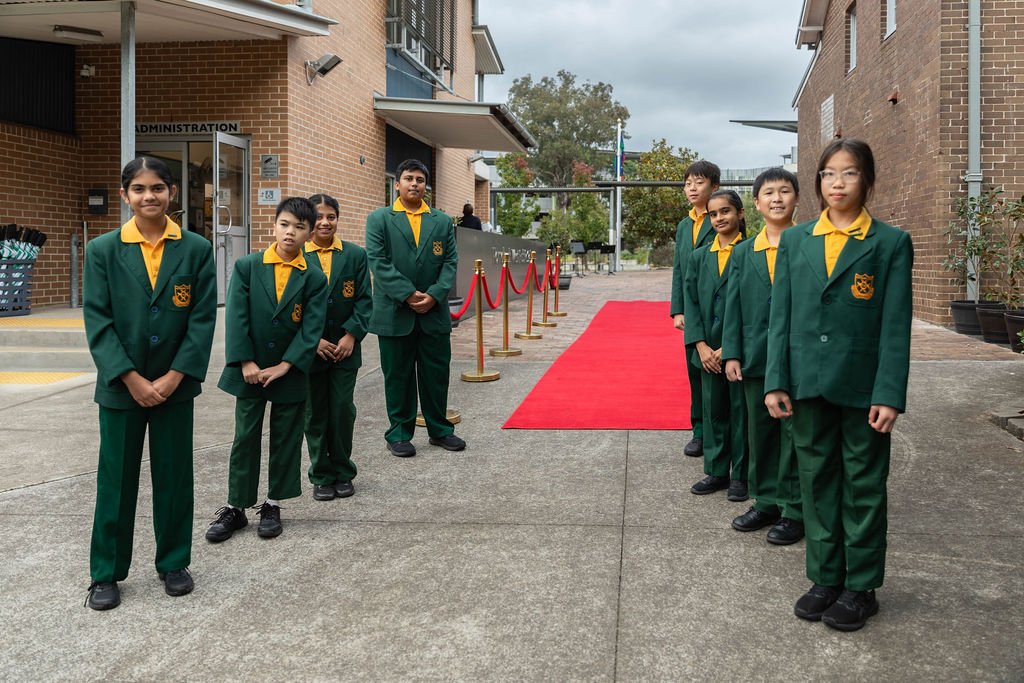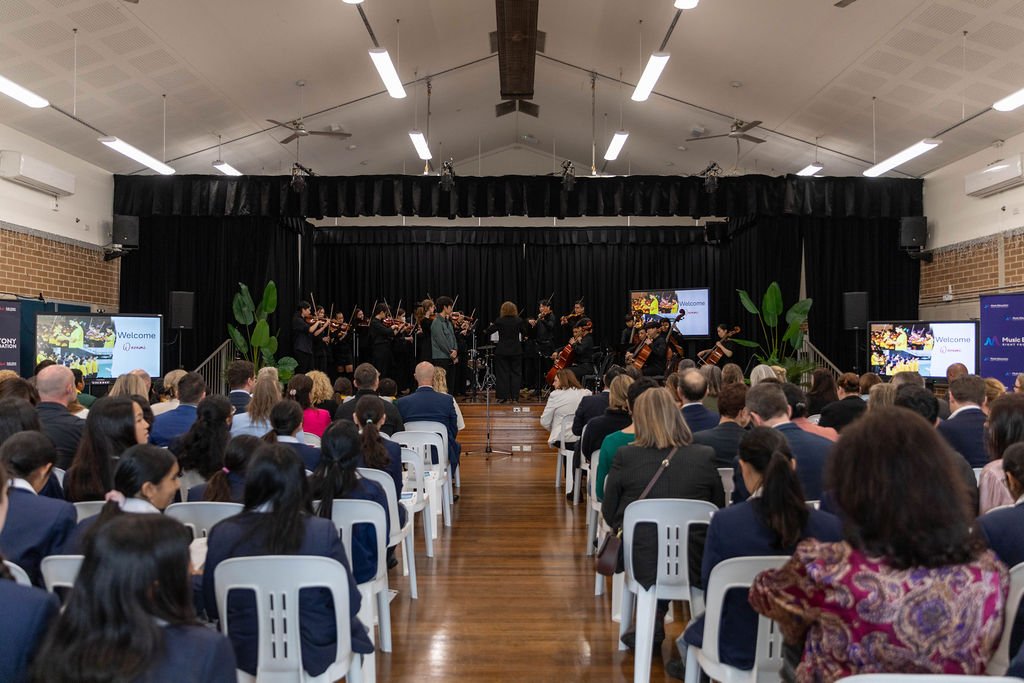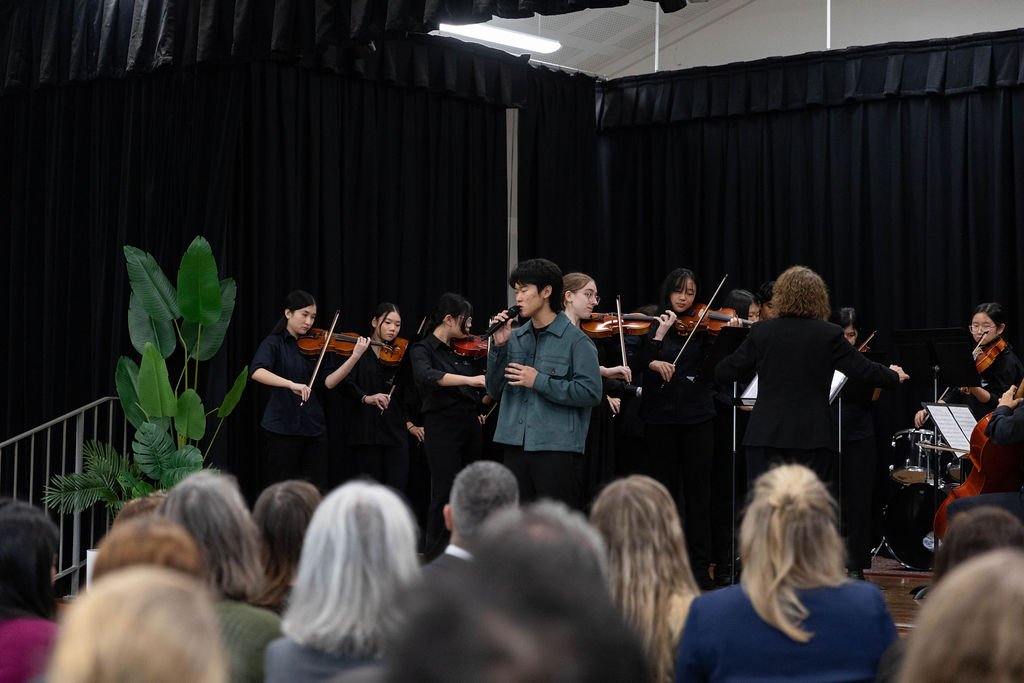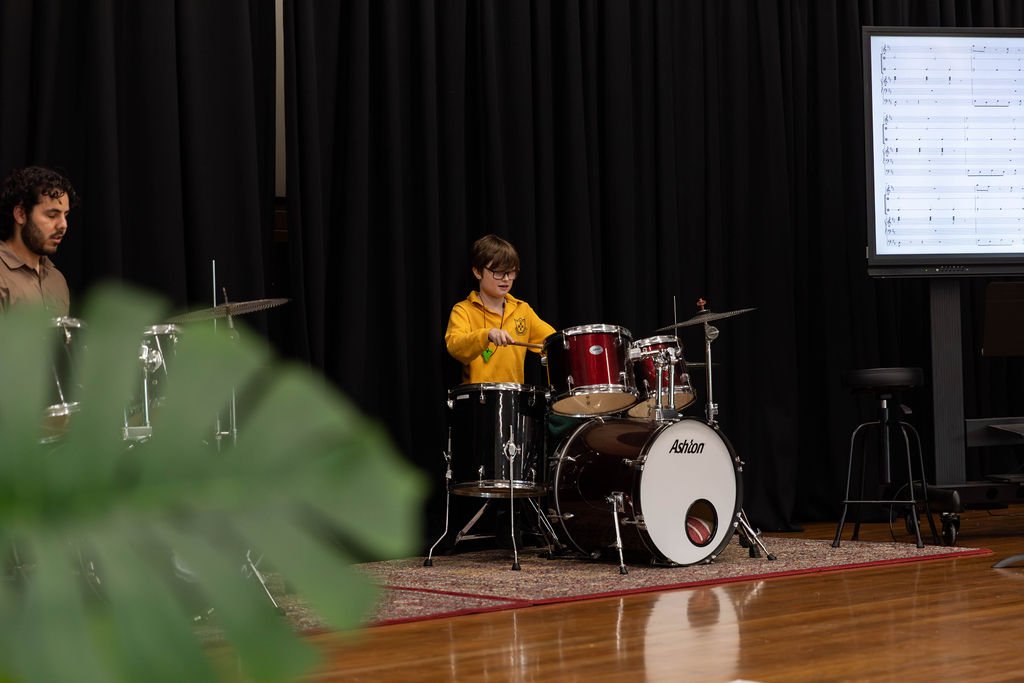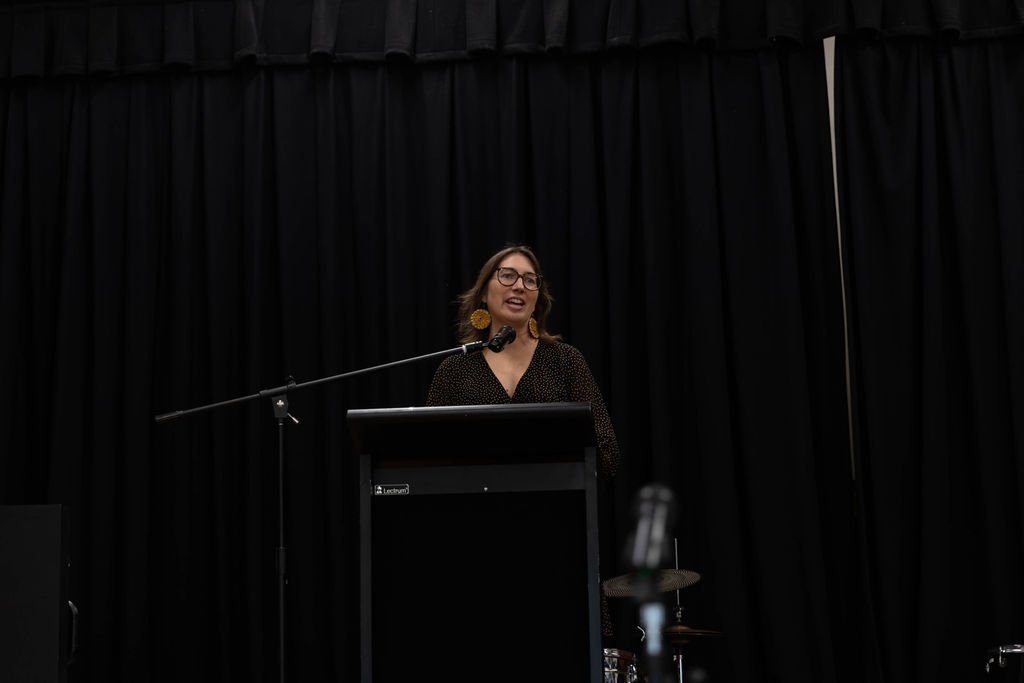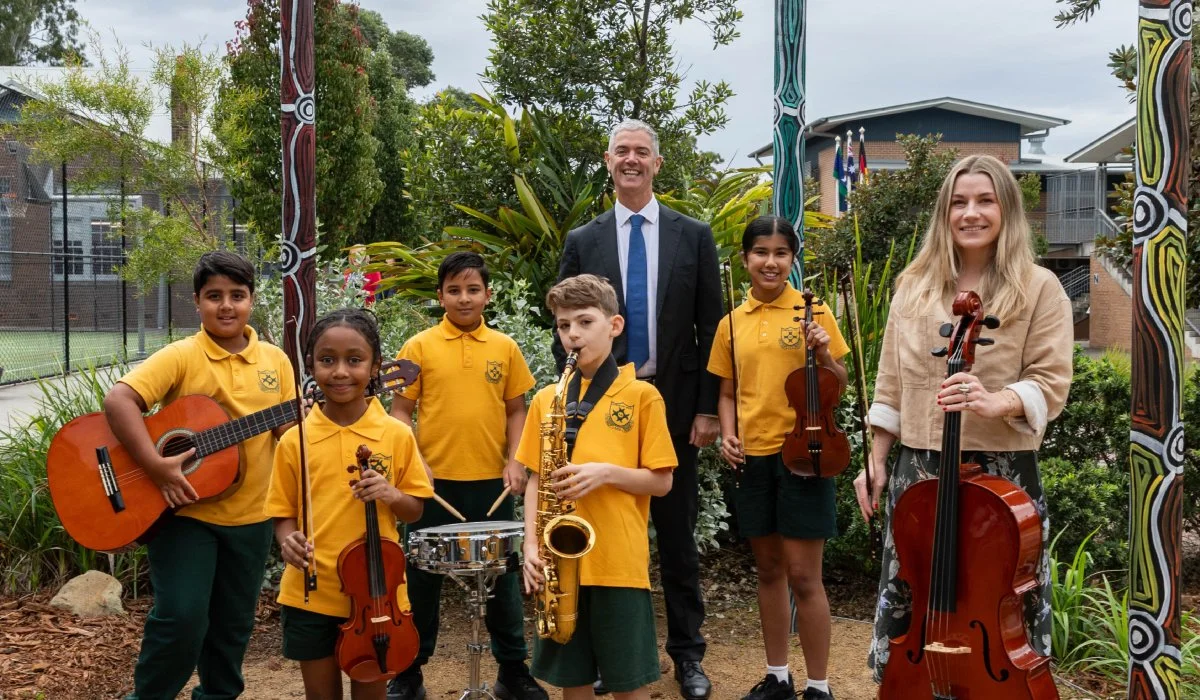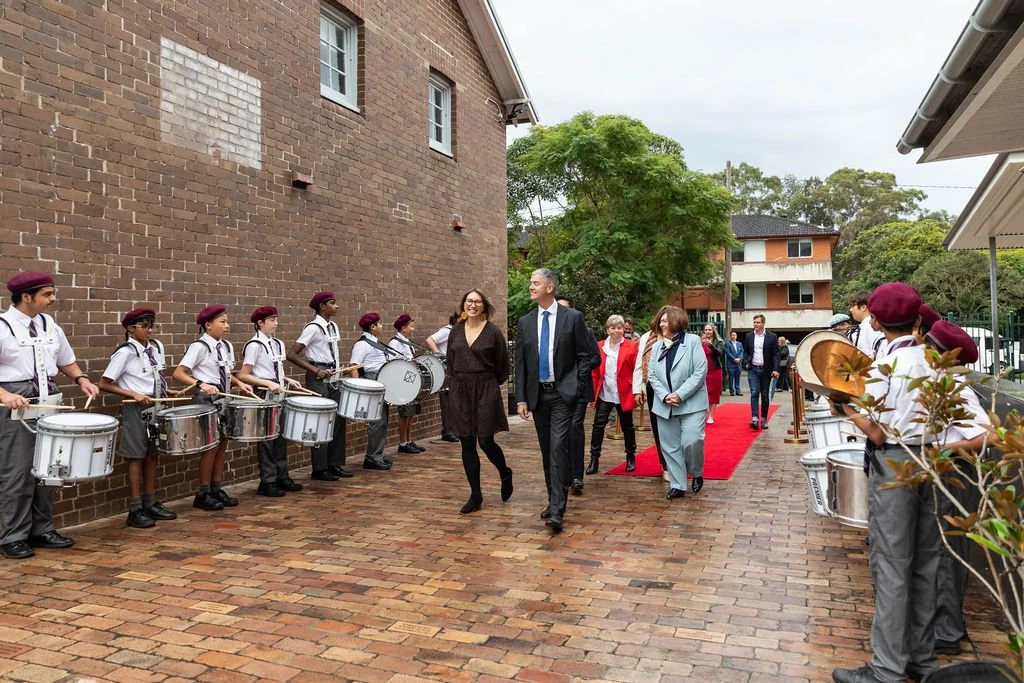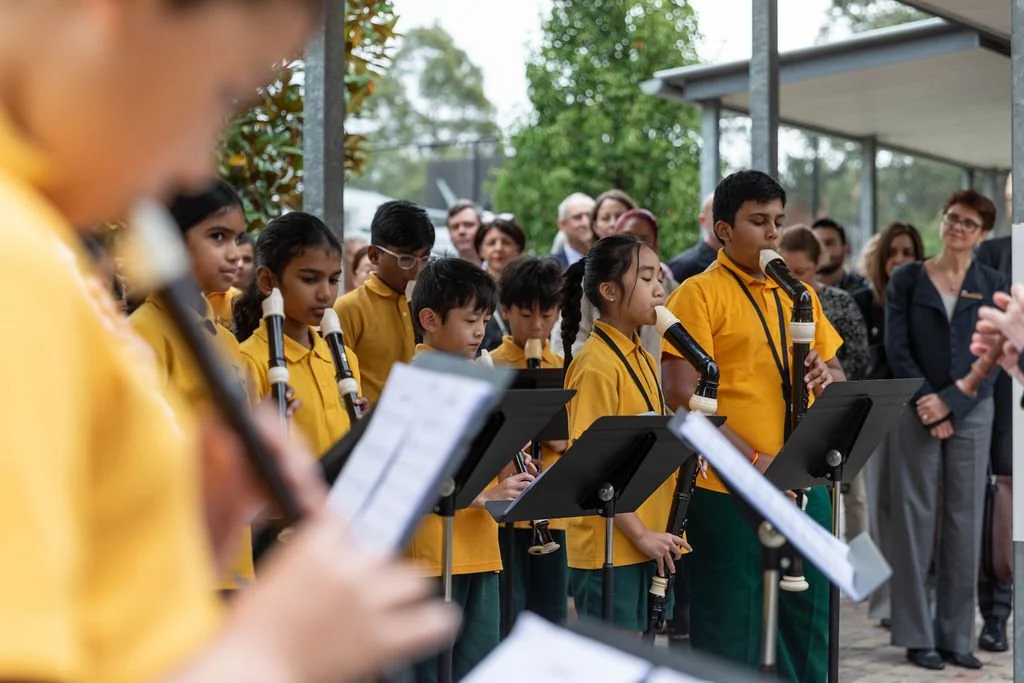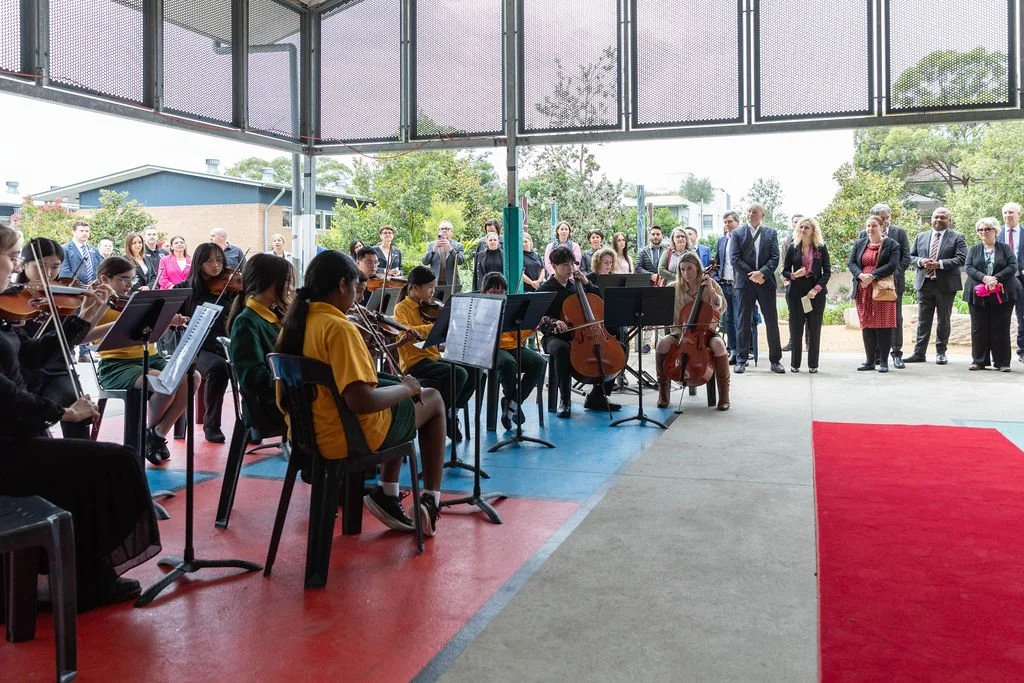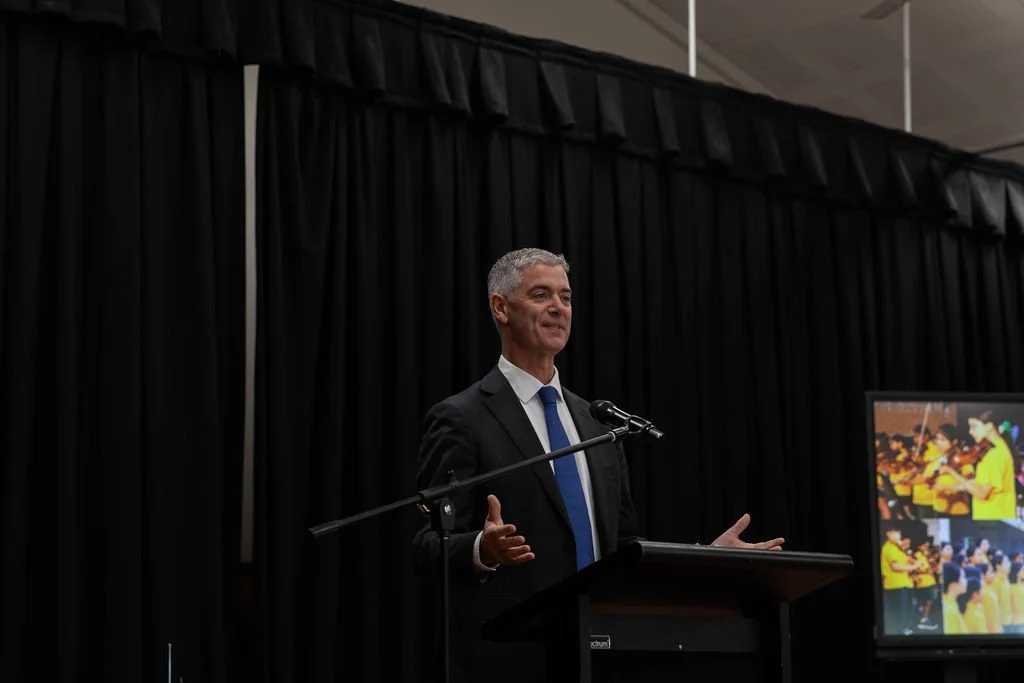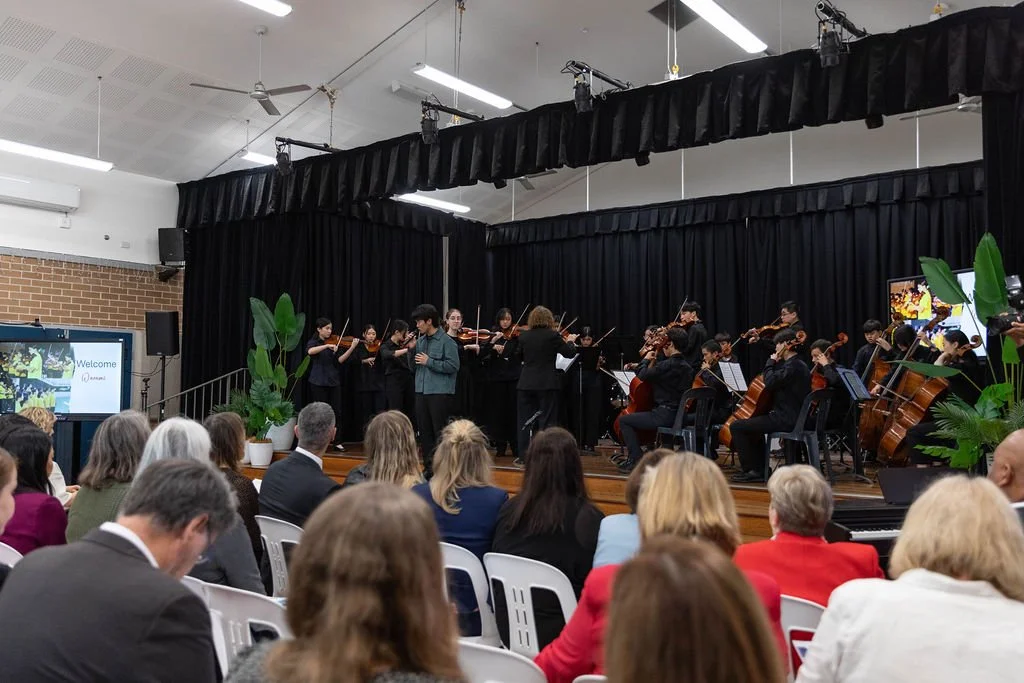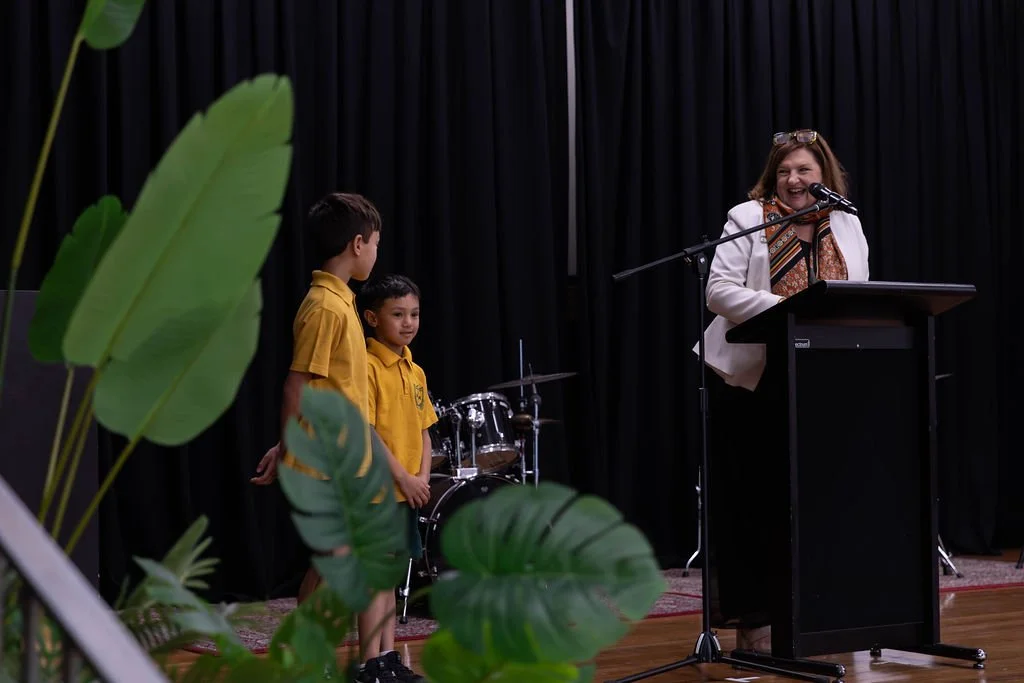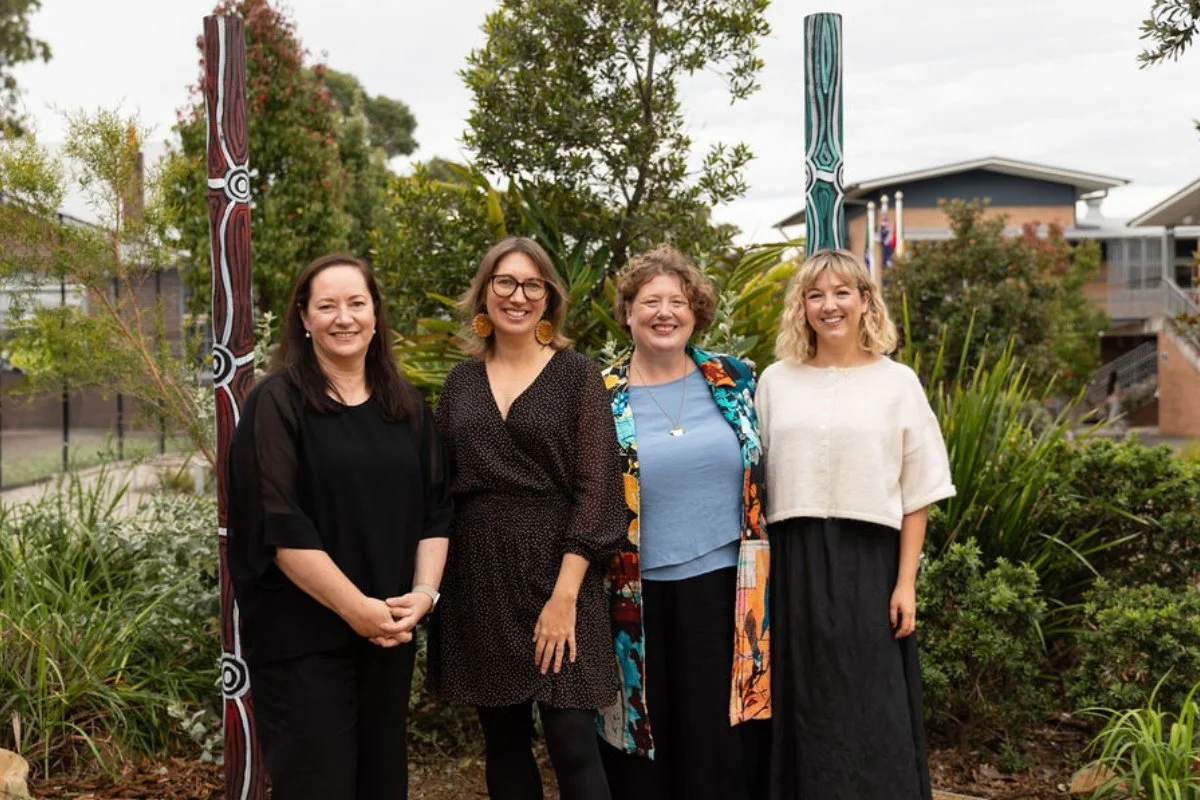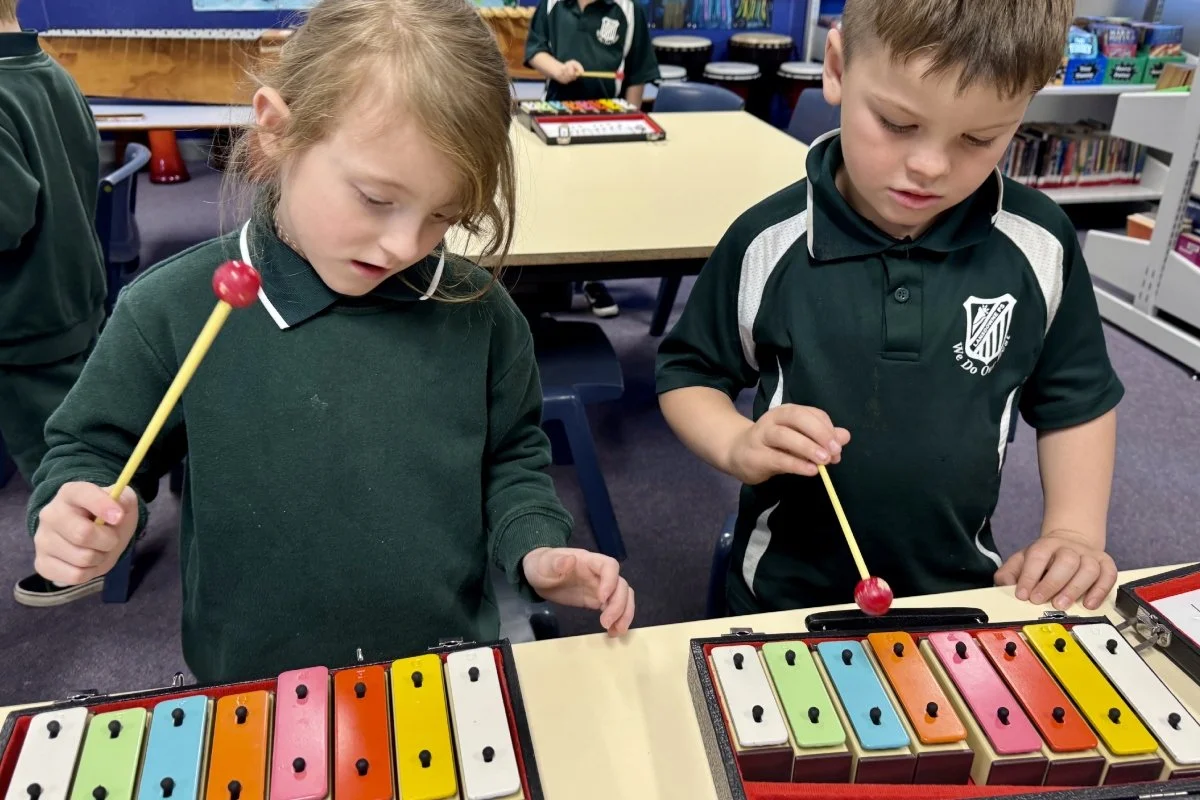“A huge head start”: Arts minister welcomes launch of new survey on music education from primary teachers’ perspective
The sound of children’s music filled the grounds of Homebush West Public School in Sydney on the morning of 15 May as The Hon. John Graham MLC, NSW Minister for the Arts, Music and the Night-time Economy, arrived to launch our landmark research report on music education in NSW primary schools. The rain cleared as the school rolled out a red carpet and a procession of student performers – choirs, strings, recorders, and an orchestra – whose music set a celebratory tone as visitors made their way through the green school grounds and into the hall. Reflecting on the warm reception, “That was quite spectacular on the way in – absolutely astonishing performances,” said the Minister. “And just a huge reminder of why we’re all here today.”
Minister Graham was joined by school leaders, educators, academics, music providers, industry representatives, and peak bodies, as well as VIP guests Ms Sally Sitou MP, federal Member for Reid, and Mr Jason Li MP, Member for Strathfield, NSW Department of Education Deputy Secretary of Primary Schools Deb Summerhayes, and NSW Teachers Federation President Henry Rajendra to unveil the ACER Primary Teachers’ Survey on music education in NSW.
Minister John Graham (with Emily Albert) was given a warm welcome by student performers as he made his way up the red carpet at Homebush West Public School. (Photo: Liz Keene Photography)
The survey of 706 teachers from 95 public primary schools provides the first comprehensive baseline of music teaching in NSW Government primary schools. It was conducted by the Australian Council for Educational Research (ACER) in partnership with Music Education: Right from the Start, the NSW Department of Education, and the NSW Teachers Federation, and proudly funded by the NSW Government through Sound NSW and Alberts | The Tony Foundation.
The survey confirmed that music education is highly valued by teachers, with the vast majority recognising its impact on learning and wellbeing: 94% agreed it enhances learning capacity, 96% agreed it reduces stress and anxiety, and 93% agreed it improves social skills and overall wellbeing. Yet despite this deep understanding, fewer than half of respondents say that music education is taught at their school for more than one term per year – meaning many students may be missing out on the proven benefits of sustained music learning, including its positive influence on literacy and numeracy.
“We just are so committed to not only those formative, grassroots experiences and inclusive experiences, but elevating all the way to ensure that talent is identified and nurtured and that students have the opportunity to be incredible performers,” says school principal Estelle Southall.
Speaking at the launch, Minister Graham welcomed the report and situated it within the NSW Government’s broader policy response to the recent Parliamentary Inquiry into Arts and Music Education. Reflecting on the Inquiry’s findings, the Minister emphasised the need for equitable access to music education: “It found that too often, economic, geographical and cultural barriers prevent equal access to a quality arts and music education. So, in response, we’re developing a 10-year Music Education Plan to build on the high-quality offerings of the public education system, and to make sure that all public-school students can access quality music education.”
He described the ACER Primary Teachers’ Survey as “a huge head start to that process,” noting that “the teachers surveyed confirmed and reminded us of some of the incredible benefits of music in the classroom.” He continued, “Another very important take-out was that 75% of teachers surveyed said they needed more training. And that two thirds of our teachers were much less confident teaching music relative to other subjects. Findings like this show that there are big gains that we can make by bolstering music in our Initial Teacher Education training at our universities.”
For the NSW study, ACER selected a representative sample of 100 schools based on location and Socio-Economic Indexes for Areas (SEIFA).
Echoing the Minister, the survey’s lead author, ACER Senior Research Fellow Dr Rebecca Taylor, identified insufficient preparation and support for generalist classroom teachers as a major barrier. Over half (55%) of respondents received less than 10 hours of music education training during their Initial Teacher Education (ITE), and a striking 82% of teachers felt their ITE didn’t equip them to teach music to the Year 6 level. Only 25% of teachers had pursued any additional musical training since completing their degrees.
Dr Taylor noted this gap in training directly affects teachers’ confidence: 73% of teachers agreed they rely on pre-recorded music lessons rather than delivering one themselves, and nearly a third (30%) did not consider music a core component of the national and NSW curriculum.
“With this survey, ACER has delivered the most comprehensive picture to date of music education in NSW primary schools, based on the experiences of those closest to the action - primary teachers in themselves,” said Emily Albert.
Neuromusical educator and senior advisor to Music Education: Right from the Start, Dr Anita Collins, explores the implications of these findings in her insights report, Setting the Tempo. She says the findings point to a deeper systemic issue – that music education is still not given its rightful place within a holistic school education.
“It’s not up front. It’s not at the centre of what’s on offer in schools, and in learning priorities it’s not very high,” she said. “But when research clearly shows that music learning directly supports literacy and numeracy, perhaps it’s time to revisit this.”
Dr Collins adds the ACER report offers vital data for the NSW Government: “By ensuring NSW has an accurate way to measure progress, identify and utilise existing talent, grow the pool of competent music teachers, and increase awareness across the workforce, the State will be better positioned to give every student equal opportunity to access quality music learning.”
“The people I work for are the 800,000 children and young people in NSW schools who deserve equitable opportunities and outcomes.,” said NSW Department of Education Deputy Secretary Primary Schools, Deb Summerhayes. “That’s what drives us every day.”
Underscoring this point, Deputy Secretary for Primary Schools Deb Summerhayes stressed that music education plays a key role in providing a holistic education. “I know firsthand the transformation that quality education can bring,” she said. “The children we work with need to be well-rounded individuals – caring, knowledgeable citizens of the future. And that means education is about more than just maths and English. It includes music. It includes all the experiences that make you a whole person, a whole human being.”
The NSW survey follows a 2024 pilot survey of South Australian primary teachers, and is part of a broader effort to build a national measurement framework for music education delivery in public primary schools – one that can be replicated across jurisdictions and over time. Sound NSW’s funding for the latest research delivers on one of three key commitments made by the then-Opposition in the lead-up to the March 2023 state election, alongside the Parliamentary Inquiry and a long-term goal of quality, sequential, and ongoing music education in NSW public schools.
“The [survey] report highlights the opportunity that if there’s any way that we can improve music education in our classrooms, there’s a raft of positive flow on benefits that it offers to kids, to schools, to the community,” said Minister Graham.
Homebush West Public School principal Estelle Southall highlights the vital role of fostering a culture of permission from the top down—where classroom teachers are empowered, supported, and equipped with the training and confidence to deliver quality music education. She has realised this vision by elevating music to equal standing with other core subjects through a robust classroom program and active collaboration with a wider local schools network, including Homebush Boys and Strathfield Girls, to amplify music’s impact across the community.
With a vision that every child will learn an instrument – beginning with the glockenspiel and ‘boomwhackers’ in kindergarten and progressing to recorders and beyond –Homebush West exemplifies how a public school can maximise existing resources to provide a high-quality, continuous music education for every student.
“We’re excited to share what we’ve learned from the teachers’ inside view—insights that will inform progress towards ensuring every child has access to quality music education,” said Emily Albert.
The day’s message was clear: advancing music education demands a united, sustained effort. There is strong momentum and activity across New South Wales, reflected in both the recent parliamentary Inquiry and the release of this new data, driving the push for more schools to follow Homebush West’s example and ensure every child has equitable access to quality music learning.
With the announcement of the 10-year Music Education Plan building on these developments, a wide range of activities and collaboration opportunities are now emerging across NSW. Together, partners have a real chance to harness this momentum and create lasting, positive change in improving music education for all students.
Emily Albert, Executive Director at Alberts and head of Music Education: Right from the Start, emphasised the potential, saying: “With the NSW Government’s new 10-year music education plan, the door is open for real change – one that’s shaped by the sector and focused on quality access for all students.”
“96% of teachers also reported that music education helps decrease stress and anxiety,” said Dr Anita Collins. “These findings point to music education as a multi-dimensional contributor to student development, supporting cognition, emotional regulation, and confidence and connectedness at school.”
Addressing the audience, she reflected, “As with raising a child, it takes a village to create change, and I would like to acknowledge the great work of all of you towards our joint pursuit of quality music education for every child.”
Emily also highlighted the collaborative nature of the ACER Primary Teachers’ Survey on music education in NSW. “The collaboration that lies at the heart of the initiative has been evident in this NSW survey conducted by ACER; developed, guided and reviewed in our close working relationship with the New South Wales Department of Education and the NSW Teachers Federation, and this initiative’s various working groups. It has been jointly-funded by the NSW Government through Sound NSW, and Alberts | The Tony Foundation. It has been a genuinely joint endeavour.”
“Lots of our students don’t necessarily have mastery of their second language, English, when they come to our school,” explained Homebush West Public School principal Estelle Southall, “but they very quickly master performance, confidence and success and connection.”
Looking ahead with optimism, she expressed hope that the government will fully embrace the opportunity before them: “The New South Wales Government, and most importantly, the Education Minister, now has just about everything needed to develop a comprehensive music education plan and roll it out across the state – and we will remain actively engaged for as long as this takes.”
(Photos: Liz Keene Photography)

